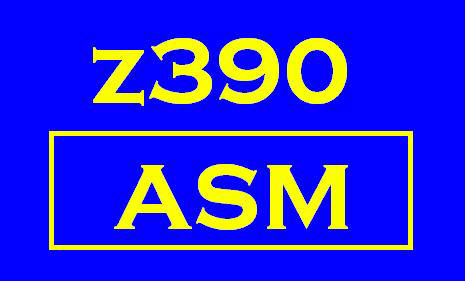
ZPAR - z390 and zcobol
Program Analysis Reports

|
|
zpar\ZPARGEN ASM demo\*.MLC
All the zcobol demo programs in the demo directory zcobol\demo can be compiled with the single command:
zpar\ZPARGEN ZC390C zcobol\demo\*.CBL
The report generator ZPARERR can be used to summarize all the ERR files generated by the z390 assembler
zpar\ZPARERR demo\*.ERR
The report generator ZPARTRS (TRace Source) can be used to obtain an execution trace showing the assembler source statement for each instruction executed along with the PSW address, condition code, module name, and relative offset within the module of the source line. For example the following command will generate execution source trace report for the demo program demo\DEMO.MLC:
asmlg
demo\DEMO trace
(assemble, link, and execute with trace)
zpar\ZPARTRS demo\DEMO
(read trace TRE, LST, and PRN files for source trace)
See examples of COBOL, Assembler, and EXEC CICS source execution traces
The utility FIXCRLF simple copies all the specified ASCII source files adding ASCII CR/LF at the end of each line. This has been used with files created with just LF at the end of each line as some editors and programs require both CR and LF.
Any and all comments, suggestions, requests, and volunteer contributors are welcome. Join the z390 email group and post to the group or email me directly.
Don Higgins
President,
Automated Software Tools Corporation
ZPARGEN can be used to assemble or compile all the programs in a directory. It can also be used to execute any specified batch command for selected files in a directory. The command syntax is as follows:
zpar\ZPARGEN command dir\file.type
command - is any batch command such as ASM or ZC390C
dir\file.type - is a directory and file selection specification
such as demo\*.mlc or
zcobol\demo\*.CBL
A temporary file named zpar\TEMPGEN.DIR is generated containing directory records for selected files. A temporary file named zpar\TEMPGEN.BAT is generated containing calls to the specified command for each selected file. Then TEMPGEN.BAT is called to execute the commands.
ZPARERR - Error Summary Report
ZPARERR can be used to summarize all the errors generated in z390 ERR files in a directory. The command syntax is as follows:
zpar\ZPARERR dir\file
dir\file - is a directory and file selection specification such as demo\* or zcobol\demo\*
A temporary file zpar\ZPARERR.DAT is generated with all the selected ERR file records. A temporary report file zpar\ZPARERR.RPT is generated with the following summary of the ERR records:
1. Current date and time of report and file selection
specified
2. Date and time stamps from beginning and end of selected
ERR records
3. Total ERR records read and total summary keys stored
4. Group 1 - total step START and END records found with
count of each different return code
5. Group 2 - total occurrences for each missing macro or
copybook
6. Group 3 - total errors for each file with 1 or more
errors
7. Group 4 - total occurrences for each error message type
8. Group 5 - total occurrences for each MNOTE message
9. Group 6 - total occurrences of any other ERR file
messages including blank lines
ZPARMLC - Frequency Distribution of MLC Operation Codes
This command reads one or more MLC or BAL type source files and generates report with frequency distribution of the operation codes found. First the counts and opcodes are listed in descending order by frequency and then alphabetically by operation code. See zcobol NIST test program generated opcodes for examples.
ZPARSUM1 - Error Summary Report with START/STOP by 2 char program prefix
Same summary of ERR file statistics as ZPARERR with addition of breaking down program START and STOP statistics by 2 character program name prefix. The command syntax is as follows:
zpar\ZPARSUM1 dir\file
ZPARSUM2 - Summary report of program translation, assembly, and execution by 2 character prefix
This command executes ZPARSUM1 and then ZPARSUM2 to produce summary report by 2 character prefix showing the number of programs translated, assembled, and executed with return code 0 or >0. For example see the NIST COBOL 1985 test results. The command syntax for this command is as follows:
zpar\ZPARSUM2 dir\file
FIXCRLF - Fix carriage return and line feed
FIXCRLF can be used to insert carriage return character (X'0D' at end of each ASCII line preceding line feed character (X'0A'). This is required by some older ASCII editors and other text processing programs. The command syntax is as follows:
zpar\FIXCRLF dir\file.type newtype
dir\file.type - is a directory and file selection specification such as mydir\*.*
newtype - new file type to be assigned to each new output file mydir\*.newtype